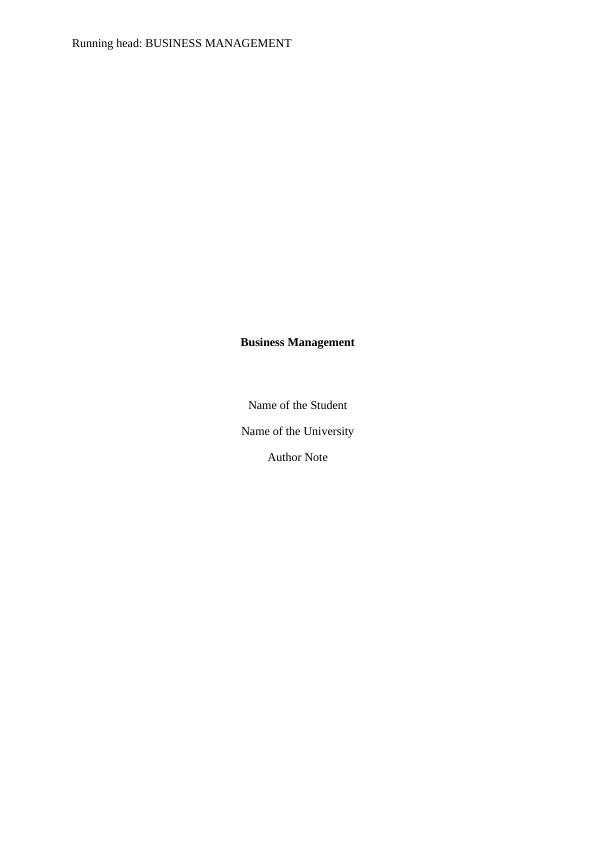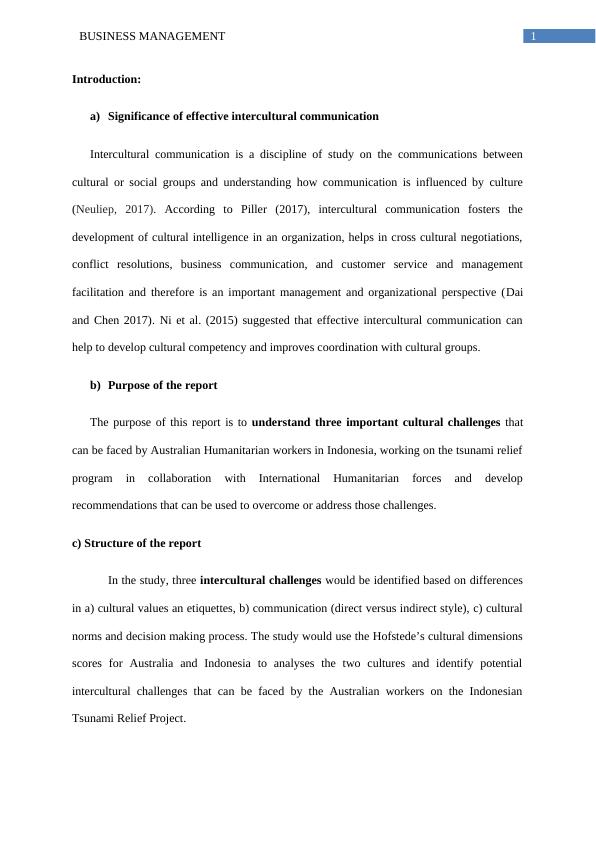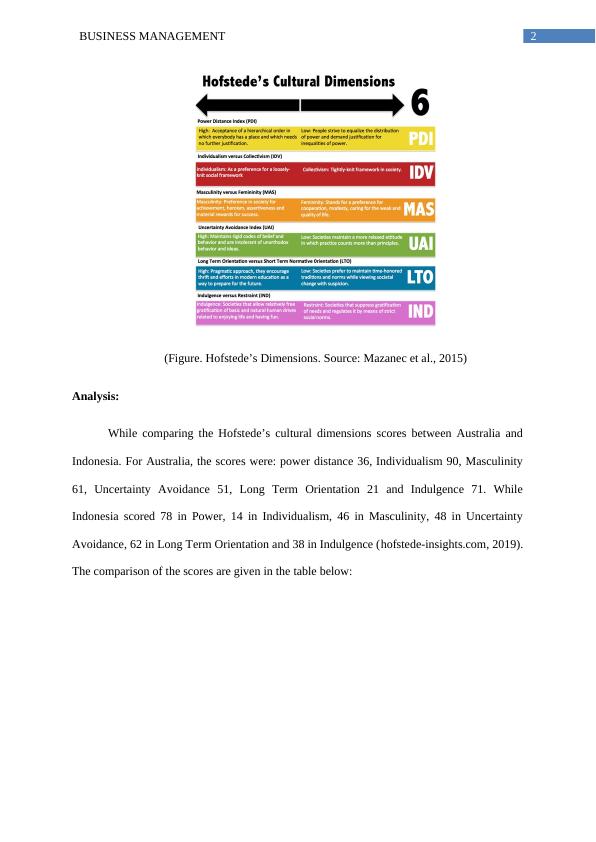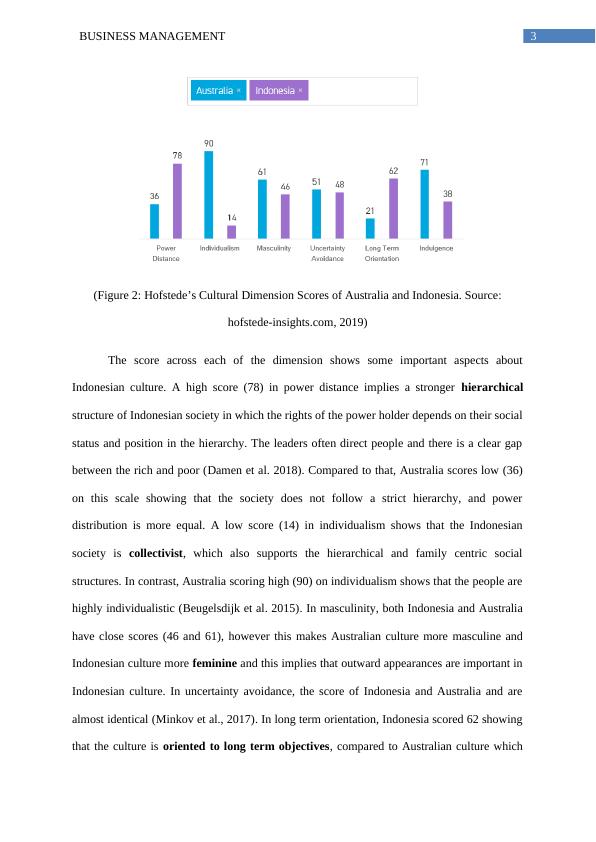Intercultural Challenges for Australian Humanitarian Workers in Indonesia
Added on 2023-04-22
12 Pages2734 Words467 Views
Running head: BUSINESS MANAGEMENT
Business Management
Name of the Student
Name of the University
Author Note
Business Management
Name of the Student
Name of the University
Author Note

1BUSINESS MANAGEMENT
Introduction:
a) Significance of effective intercultural communication
Intercultural communication is a discipline of study on the communications between
cultural or social groups and understanding how communication is influenced by culture
(Neuliep, 2017). According to Piller (2017), intercultural communication fosters the
development of cultural intelligence in an organization, helps in cross cultural negotiations,
conflict resolutions, business communication, and customer service and management
facilitation and therefore is an important management and organizational perspective (Dai
and Chen 2017). Ni et al. (2015) suggested that effective intercultural communication can
help to develop cultural competency and improves coordination with cultural groups.
b) Purpose of the report
The purpose of this report is to understand three important cultural challenges that
can be faced by Australian Humanitarian workers in Indonesia, working on the tsunami relief
program in collaboration with International Humanitarian forces and develop
recommendations that can be used to overcome or address those challenges.
c) Structure of the report
In the study, three intercultural challenges would be identified based on differences
in a) cultural values an etiquettes, b) communication (direct versus indirect style), c) cultural
norms and decision making process. The study would use the Hofstede’s cultural dimensions
scores for Australia and Indonesia to analyses the two cultures and identify potential
intercultural challenges that can be faced by the Australian workers on the Indonesian
Tsunami Relief Project.
Introduction:
a) Significance of effective intercultural communication
Intercultural communication is a discipline of study on the communications between
cultural or social groups and understanding how communication is influenced by culture
(Neuliep, 2017). According to Piller (2017), intercultural communication fosters the
development of cultural intelligence in an organization, helps in cross cultural negotiations,
conflict resolutions, business communication, and customer service and management
facilitation and therefore is an important management and organizational perspective (Dai
and Chen 2017). Ni et al. (2015) suggested that effective intercultural communication can
help to develop cultural competency and improves coordination with cultural groups.
b) Purpose of the report
The purpose of this report is to understand three important cultural challenges that
can be faced by Australian Humanitarian workers in Indonesia, working on the tsunami relief
program in collaboration with International Humanitarian forces and develop
recommendations that can be used to overcome or address those challenges.
c) Structure of the report
In the study, three intercultural challenges would be identified based on differences
in a) cultural values an etiquettes, b) communication (direct versus indirect style), c) cultural
norms and decision making process. The study would use the Hofstede’s cultural dimensions
scores for Australia and Indonesia to analyses the two cultures and identify potential
intercultural challenges that can be faced by the Australian workers on the Indonesian
Tsunami Relief Project.

2BUSINESS MANAGEMENT
(Figure. Hofstede’s Dimensions. Source: Mazanec et al., 2015)
Analysis:
While comparing the Hofstede’s cultural dimensions scores between Australia and
Indonesia. For Australia, the scores were: power distance 36, Individualism 90, Masculinity
61, Uncertainty Avoidance 51, Long Term Orientation 21 and Indulgence 71. While
Indonesia scored 78 in Power, 14 in Individualism, 46 in Masculinity, 48 in Uncertainty
Avoidance, 62 in Long Term Orientation and 38 in Indulgence (hofstede-insights.com, 2019).
The comparison of the scores are given in the table below:
(Figure. Hofstede’s Dimensions. Source: Mazanec et al., 2015)
Analysis:
While comparing the Hofstede’s cultural dimensions scores between Australia and
Indonesia. For Australia, the scores were: power distance 36, Individualism 90, Masculinity
61, Uncertainty Avoidance 51, Long Term Orientation 21 and Indulgence 71. While
Indonesia scored 78 in Power, 14 in Individualism, 46 in Masculinity, 48 in Uncertainty
Avoidance, 62 in Long Term Orientation and 38 in Indulgence (hofstede-insights.com, 2019).
The comparison of the scores are given in the table below:

3BUSINESS MANAGEMENT
(Figure 2: Hofstede’s Cultural Dimension Scores of Australia and Indonesia. Source:
hofstede-insights.com, 2019)
The score across each of the dimension shows some important aspects about
Indonesian culture. A high score (78) in power distance implies a stronger hierarchical
structure of Indonesian society in which the rights of the power holder depends on their social
status and position in the hierarchy. The leaders often direct people and there is a clear gap
between the rich and poor (Damen et al. 2018). Compared to that, Australia scores low (36)
on this scale showing that the society does not follow a strict hierarchy, and power
distribution is more equal. A low score (14) in individualism shows that the Indonesian
society is collectivist, which also supports the hierarchical and family centric social
structures. In contrast, Australia scoring high (90) on individualism shows that the people are
highly individualistic (Beugelsdijk et al. 2015). In masculinity, both Indonesia and Australia
have close scores (46 and 61), however this makes Australian culture more masculine and
Indonesian culture more feminine and this implies that outward appearances are important in
Indonesian culture. In uncertainty avoidance, the score of Indonesia and Australia and are
almost identical (Minkov et al., 2017). In long term orientation, Indonesia scored 62 showing
that the culture is oriented to long term objectives, compared to Australian culture which
(Figure 2: Hofstede’s Cultural Dimension Scores of Australia and Indonesia. Source:
hofstede-insights.com, 2019)
The score across each of the dimension shows some important aspects about
Indonesian culture. A high score (78) in power distance implies a stronger hierarchical
structure of Indonesian society in which the rights of the power holder depends on their social
status and position in the hierarchy. The leaders often direct people and there is a clear gap
between the rich and poor (Damen et al. 2018). Compared to that, Australia scores low (36)
on this scale showing that the society does not follow a strict hierarchy, and power
distribution is more equal. A low score (14) in individualism shows that the Indonesian
society is collectivist, which also supports the hierarchical and family centric social
structures. In contrast, Australia scoring high (90) on individualism shows that the people are
highly individualistic (Beugelsdijk et al. 2015). In masculinity, both Indonesia and Australia
have close scores (46 and 61), however this makes Australian culture more masculine and
Indonesian culture more feminine and this implies that outward appearances are important in
Indonesian culture. In uncertainty avoidance, the score of Indonesia and Australia and are
almost identical (Minkov et al., 2017). In long term orientation, Indonesia scored 62 showing
that the culture is oriented to long term objectives, compared to Australian culture which

End of preview
Want to access all the pages? Upload your documents or become a member.
Related Documents
Assignment On Cross Cultural Management Analysislg...
|10
|2407
|19
Impact of Cultural Dimensions on Wellbeing Experiences of International Studentslg...
|9
|1931
|1
(pdf) International Human Resource Management (pdf)lg...
|12
|2611
|49
Do Australians and New Zealanders Doing business with Indonesia?lg...
|6
|1937
|7
E-Learning Activities Blog (pdf)lg...
|8
|1776
|95
Cultural Dimensions and Managing Organizational Culturelg...
|8
|1583
|205
